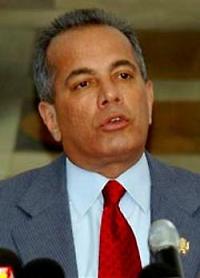Chavez Opponents Unite Behind One Man
Eight candidates opposing Venezuelan President Hugo Chavez called off a primary election set for Sunday, saying they had unanimously agreed to support the front-runner and best financed among them, Gov. Manuel Rosales. The announcement was seen as a bow to the financial and political cost of holding a primary and to the reality that Rosales by far stood the best chance against Chavez in the Dec. 3 presidential balloting. Previously, the Zulia state governor and seven other politicians had promised to abide by the primary results. The presidential campaign kicks off this week, and Chavez is expected to formally file for re-election Saturday. The former army paratrooper, who took power in 1999 and who has withstood a coup attempt, a crippling general strike and recall election, is the heavy favorite to win another term.
Governor Manuel Rosales According to one recent poll, Rosales, 53, trails Chavez in preference polls with only 9 percent of likely respondents saying they would vote for him, compared with Chavez's 56 percent support. Chavez, a harsh critic of U.S. policy and President Bush, has built a strong following among the poor for his use of the nation's oil wealth to promote health, education, housing and discount food social programs. Rosales acknowledged in television and radio interviews yesterday that he faces un uphill battle and that "time is short." But in an acceptance speech before supporters he hammered away at what some analysts say are Chavez's vulnerabilities: his massive foreign aid programs, the government-approved takeovers of land and buildings, and the perception that crime is on the increase. "The government wants to be the owner of all private property," Rosales said. "We will distribute land to the peasants but we will buy it in such a way as to respect the principle of private property, just as we will respect those of human rights and social justice." There was no official reaction early yesterday from Chavez or his staff about the choosing of Rosales. In a ruling this week that brought relief to the governor's supporters, the National Election Council said Rosales could run for president without having to resign his governorship, as some had said the law required. However, the council also refused to set campaign spending caps, a move perceived as giving an advantage to Chavez.
Hugo Chavez Rosales is a father of eight children whose education extended only through high school. He is a lifelong politician who enjoys solid support in Zulia, a prosperous oil- and cattle-producing state. His fiery anti-Chavez oratory plus his visibility and financial resources as governor propelled him to the top of the list of challengers. The challenger with second-best poll numbers after Rosales, attorney and talk show host Julio Borges, said through a spokeswoman yesterday that he will be Rosales's running mate for vice president. "Just as the rest of the candidates do, Julio supports 100 percent the naming of Rosales," said the Borges spokeswoman. In a television interview, Rosales promised to devote one-fifth of oil revenues to providing housing and other benefits to the poor and the "impoverished middle class," an acknowledgment of the basis of Chavez's appeal. But he also promised to halt the Chavez policy of taking over and redistributing privately held farm land to peasants, saying his government would instead buy land for redistribution, respecting property rights. If elected, Rosales would halt all foreign oil giveaway programs, including sales of discounted oil to Cuba, until Venezuela reduces its high poverty rate. Through a program called Petrocaribe, Chavez also sells oil at a discounted price to 15 Caribbean nations. In other developments, Chavez government announced that Nicolas Maduro, president of the National Assembly, will take over as foreign minister, replacing longtime Chavez confidant Ali Rodriguez. In recent weeks, Chavez has made three other Cabinet changes, including naming his brother Adan as planning minister.


































<< Home